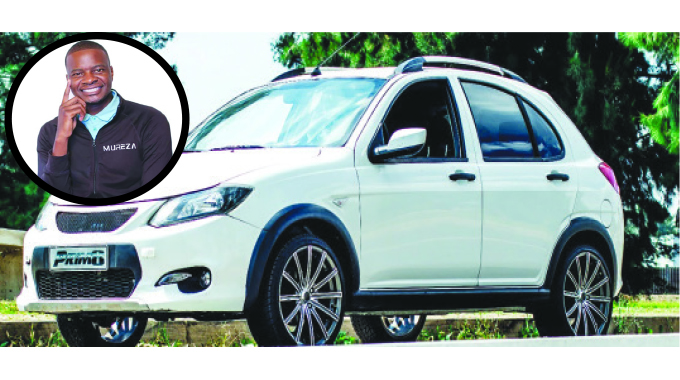Pioneer car designer making ‘Made in Africa’ a reality

Tatenda Mungofa has had an absolute dream career in automotive design, a difficult terrain for African engineers and start-ups. He broke into the highly competitive African motoring industry through designs for his high flying car project – Mureza Automotive Company, formed through a partnership. In this report, Sifelani Tsiko (ST) Agric, Environment & Innovations Editor speaks to Tatenda Mungofa (TM) one of a few blacks to make it into the vehicle manufacturing sector about his dream, his unusual route into car design and how he ploughed his own furrow to become a prominent figure of young Africans altering the global motoring industry.
ST: Can you briefly tell us about yourself and your background?
TM: I am a 33 -year -old Zimbabwean car designer born and raised in Zimbabwe. After high school I ventured into entrepreneurship selling phones, laptops and stationery then ended up selling cars. Taught myself how to design cars relying mainly on internet tutorials and now I am a board member for African Automotive Design Association. Am also Head of Design and CEO of Mureza Holdings (Pty) Ltd South Africa.
ST: What were your dreams as a young boy growing up in Zimbabwe?
TM: Cars have always been my passion. My dream was to build my own brand of vehicles that African people could be proud of. Part of that dream was also to build an industrial empire that could employ as many people as possible.
ST: Did you do any training in car designing and manufacturing at college or university level?
TM: The answer is no. I taught myself how to design cars using sketch-pads, my laptop and the internet only. After mastering the basic principles, I entered into design competitions to validate my skills on the world stage.
ST: What made you venture into car making?
TM: It’s not the what but rather WHY! Africa had no successful car brand that is sold globally like Toyota from Japan or Ford from America. I wanted to change the perception that we should rely on imports for transport. Our company is working to localise production of vehicles and be globally competitive.
ST: Tatenda, can you briefly tell us about Mureza Auto Company and how it started?
TM: Mureza started as a car sales business in 2009 that operated until 2016 in Zimbabwe and sold over 300 cars in that period. In 2012, I entered the Scuderia design challenge and after coming third globally, I was encouraged to start my own brand of vehicles. After doing some online research, I realised that there was an opportunity for an African car manufacturer and I travelled to South Africa to engage the suppliers on how we could work together. By 2016 I had gathered enough information on how to manufacture cars and we registered Mureza Auto Co (Pty) Ltd which designed concepts for manufacturing.
We were fortunate to find an original equipment manufacturer (OEM) partner who adopted one of our designs into a commercial product and the Prim8 was born.
ST: What is the story behind the name ‘Mureza?’ How did you come to choose this name?
TM: Mureza means flag in Shona. I wanted to give my company a name that stood out and had meaning and could be spoken in my own language.
My inspiration came from the national anthem of Zimbabwe in raising up the flag — I felt that the country was generally disgraced and our flag was always the last on any internet search.
I decided to take this as a challenge to ‘raise the flag’ in the automotive industry!
ST: Can you shed some light on your entrepreneurial journey with Mureza Auto Company? How many jobs has your company created?
TM: Mureza has 12 permanent employees at head office in South Africa. We have regional offices and international correspondence offices that take our staff complement to 30.
The production line under our management has 200 people and this will soon expand as we roll out production in Africa. We are building a dealership network and after-market ecosystem that will create a further 1 000 jobs over the next few years in Africa.
ST: As one of Africa’s first black-owned car manufacturing companies, you recently announced that your company was rolling out the first batch of 100 vehicles into the markets in South Africa and Zimbabwe. Tell us about the latest step and the brands you are rolling out.
TM: We recently rolled out PROJECT 100 which was aimed at securing orders from the early adopters of our brand. This is the rolling out of a limited-edition version of the Prim8.
This elect group will get a chance to be part of the build of their custom vehicles at our manufacturing plant.
There are more product ranges like pickups, SUVs, Sedans and EVs that we will roll out soon. Another exciting project is PROJECT 1 000 — we are looking to partner with SME companies and promising entrepreneurs in Africa to grow their businesses in partnership with our vehicles!
ST: How do you feel about this achievement?
TM: It’s a very huge milestone in our journey and I am proud of the team and all our stakeholders and investors that made this possible. The fact, however, is that this is just the beginning! There is more work to be done and we feel our journey is just starting in Africa.
ST: How do you intend to break into the highly competitive motoring industry? What are the prices like for your models?
TM: The Prim8 will retail for US$13,500 in Zimbabwe (or equivalent in RTGS$) and we encourage people in Zimbabwe to use the local currency option. We do not believe in competing as we see that the African market is big enough for multiple players. Information of our vehicles will be available for display at our dealership partner YAKIMA AUTO (PVT) LTD in Braeside, Harare. We are reachable at our offices in Harare. Our future models will always be priced to accommodate the levels of income in Africa and their design, practicality and value chain will be uniquely African.
ST: What challenges are you encountering as you break into the competitive motoring terrain?
TM: The main challenge was always to be taken seriously by suppliers and investors while showcasing designs sketches on paper and computer images. Market acceptance is always a challenge. Any new brand needs to fight to overcome this and we have been doing just that.
ST: For the past decades, the automotive industry has largely been dominated by European, American and Asian car making giants. What is your comment on the rise of cars made by Africans and for the African market?
TM: I hope to see African car brands dominating global markets. I believe Africans have got what it takes to transform the automotive market.
ST: What can you say about the future of the Made in Africa car dream? What is your message to young people in Africa dreaming about breaking into the car designing and manufacturing industry?
TM: My final words are do not just dream about it, get up and do it! There are no limits to what Africans can make because we have all the resources.
Despite what people think, Africa has enough financial capacity to build any project it desires if there is unity of purpose and if the African consumers can support such initiatives. It is time for Africa to prosper and Africans should lead in this investment drive.







Comments